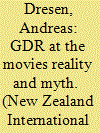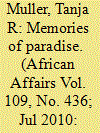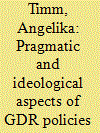|
|
|
Sort Order |
|
|
|
Items / Page
|
|
|
|
|
|
|
| Srl | Item |
| 1 |
ID:
031505


|
|
|
|
|
| Publication |
London, George Allen and Unwin, 1983.
|
| Description |
xiii, 346p.Pbk
|
| Standard Number |
0043540309
|
|
|
|
|
|
|
|
|
|
|
|
Copies: C:1/I:0,R:0,Q:0
Circulation
| Accession# | Call# | Current Location | Status | Policy | Location |
| 023111 | 943.1087/CHI 023111 | Main | On Shelf | General | |
|
|
|
|
| 2 |
ID:
097683


|
|
|
| 3 |
ID:
098088


|
|
|
|
|
| Publication |
2010.
|
| Summary/Abstract |
During the Cold War, state-led education exchange programmes between post-colonial states and the former German Democratic Republic (GDR) were common. The biggest such project, the School of Friendship (SdF), sent 899 Mozambican children for socialist-inspired schooling in the GDR. By the time they returned to Mozambique in 1988, the transition from socialist-revolutionary state to capitalist society was under way. This article discusses the legacies of socialist education, focusing on the lives of some of those who spent the decisive years of adolescence in the GDR. The narratives give insights into the contradictory social reality of this historical period, showing how the SdF equipped the participants with 'modern' virtues that became vital for their future lives, but which had also become largely obsolete by the time they returned to Mozambique. The SdF could thus be judged as a highly politicized programme where children were treated as pawns in a wider political game, while at the same time new horizons opened for its participants.
|
|
|
|
|
|
|
|
|
|
|
|
|
|
|
|
| 4 |
ID:
170955


|
|
|
| 5 |
ID:
144975


|
|
|
|
|
| Summary/Abstract |
THE 25TH ANNIVERSARY of the incorporation of the German Democratic Republic into the Federal Republic of Germany fell at the year of the 70th anniversary of the victory over Nazi Germany in World War II, which saved the world from Nazism. This is an extra reason to try to see what conclusions the Germans drew from events that had become turning points not only in their own but in world history. One would be able to describe today's Germany with its determining influence on the policies of the European Union as a mini-great power, a country on which a lot depends worldwide. Periods when Germany was a great power properly speaking, both as the empire of the Kaisers and as the Third Reich, ended up in global disasters. Have the Germans learned those painful lessons of history? Before this question is answered, even approximate forecasting of the future of our continent is impossible.
|
|
|
|
|
|
|
|
|
|
|
|
|
|
|
|
| 6 |
ID:
127690


|
|
|
|
|
| Publication |
2014.
|
| Summary/Abstract |
THE FALL OF THE BERLINWALL IN 1989, THE REUNIFICATION OF GERMANY a year later, and unlimited access granted to scholars to former East German archives in the aftermath of these momentous events, enabled the publication from the mid-1990s onwards of the first exhibition catalogues, monographs, journal articles and edited collections on the subject of consumption in the GDR (Merkel &Mu¨hlberg 1996; Zatlin 1997, 1999; Merkel 1998, 1999; Kaminsky 2001; Heldmann 2001; Poutrus 2002). While many of these works were initially written in German, less than a decade later, during the 2000s, a bourgeoning literature looking at key aspects of East German consumption emerged in English as well (Crew 2003; Stitziel 2005; Landsman 2005; Zatlin 2007; Rubin 2008, 2009). Inspired by some pioneering studies such as those of Jonathan Zatlin and Ina Merkel, the new works emphasised the close relationship between the party-state and the consumer desires of millions of citizens in the GDR. Be it about acquiring a Trabant, modern furniture, plastic goods, fashionable shoes and dresses, and even owning expensive collections of erotic photographs (McLellan 2009), such manifestations of individual consumer desires spoke about the centrality of consumption as practice, expectation and social imaginary in the lives of East Germans. After their strong focus on the former GDR, scholars of consumption under communism have lately shifted their interest to an examination of socialist consumerism in the Eastern
Bloc as a whole. The books under review here are the most recent manifestations of this shift. Through their wider geographic coverage, the three books discussed in this article further expand on and provide nuance to what we already know about the avatars of consumption under communism.
|
|
|
|
|
|
|
|
|
|
|
|
|
|
|
|
| 7 |
ID:
151604


|
|
|
|
|
| Summary/Abstract |
SOME TWENTY-FIVE YEARS ago, those who in the old dispute about the role of the individual in history argued that success of political initiatives depended on the ability of state leaders to look into the future acquired another argument. Tired of the string of failed reforms inside the country and trying to get rid of the tag of failures, the Soviet "architects of perestroika" turned their attention to the global world. A talented man is talented in everything: by the same token, once a failure always a failure. The predecessors of the "Pokemon catchers" of our times borrowed the Anglo-American derogatory "looser," an apt definition of the "foremen of Soviet perestroika": the accolades piled up on them in the West transformed into tragic failures inside the country they ventured to make happy.
|
|
|
|
|
|
|
|
|
|
|
|
|
|
|
|
|
|
|
|
|